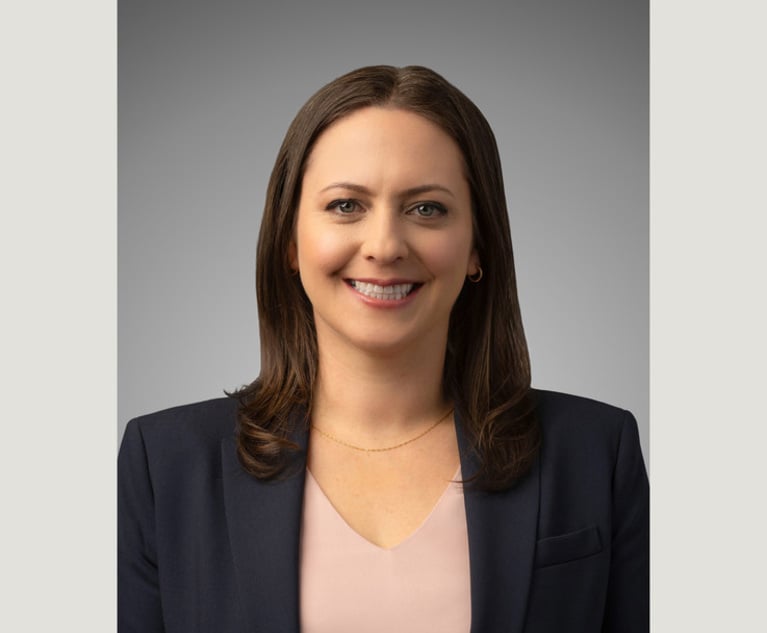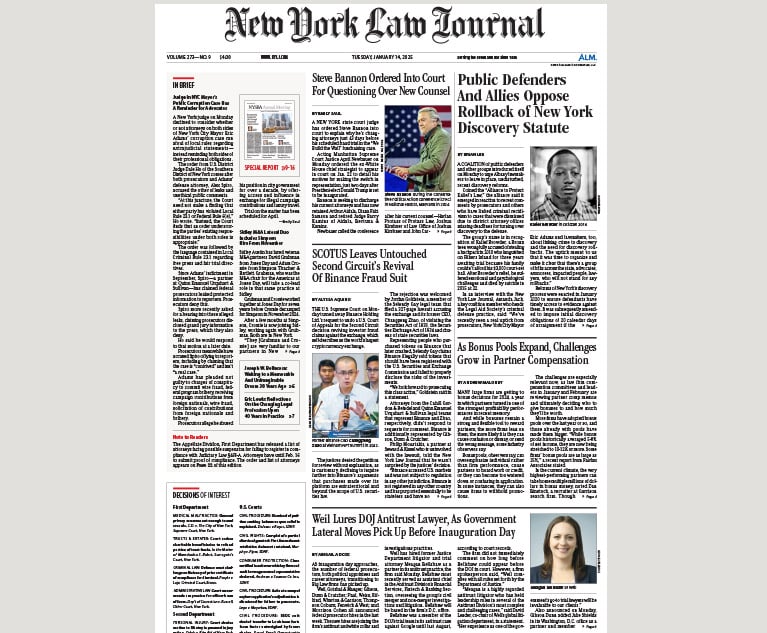Seyfarth Report Finds 2019 Another Record Year for ADA Title III Suits—Nationally and in NY
New York state set a statewide record with its number of ADA Title III federal suits, accounting for 2,635 of the 11,053 suits lodged nationally, according to data painstakingly compiled by the law firm Seyfarth Shaw.
February 27, 2020 at 06:34 PM
3 minute read
 Photo: designer491/Shutterstock.com
Photo: designer491/Shutterstock.com
More than 11,000 Americans with Disabilities Act Title III—or private entity access—lawsuits were launched in the federal courts in 2019, setting a record for the number of Title III lawsuits lodged nationally in a year since the law firm Seyfarth Shaw began compiling the data about seven years ago.
New York state set its own statewide record with its number of suits, accounting for 2,635 of the 11,053 suits nationwide, Seyfarth reports. New York was second only to California's 4,794 Title III federal actions, which was a record yearly amount in the Golden State.
On the whole, California, New York and Florida continued to lead the nation, by far, in having the highest numbers of ADA Title III federal suits. The three states accounted for 84% of all the suits launched nationwide, according to Seyfarth data set out in a Feb. 20 blog post by Seyfarth labor and employment partners by Minh Vu and Kristina Launey, as well as by Seyfarth librarian Susan Ryan.
The Seyfarth data shows that each year the firm has collected the data, the number of Title III actions has risen nationally, jumping from 2,722 in 2013 to 11,053 in 2019.
 Courtesy of Seyfarth Shaw
Courtesy of Seyfarth ShawIn their post, the law partners, who have led the ADA-suit data collection, and librarian Ryan write that the "record-breaking" 2019 numbers include Title III actions filed "on all grounds," including access to "physical facilities, websites and mobile applications, service animals, sign language interpreters, and more."
The Seyfarth figures, they note, don't include the "significant number of disability access lawsuits filed in state courts which are much more difficult to accurately track."
In a Jan. 6 Seyfarth blog post by Washington, D.C.-based partner Vu—in which she examined, in part, what types of Title III lawsuits are "trending now"—she pointed to, in one example, Braille gift card actions lodged in New York's busiest federal courts.
Since October 2019, she wrote, "more than a dozen blind plaintiffs represented by five attorneys have filed at least 243 lawsuits in the Southern and Eastern districts of New York alleging that retailers and other businesses have violated the ADA and New York state and city laws by failing to offer for sale gift cards that have all the information printed on the cards shown in Braille." She noted that the cases had been assigned to at least 29 different judges.
Among other trending types of Title III suits pointed to by Vu were website and mobile app accessibility lawsuits, hotel accessibility information on reservations websites, and the many inaccessible facilities suits that she wrote historically have been prolific.
Vu and her co-authors, in the more recent post on the 2019 statistics, explain that, to collect the data, the firm used "a painstaking manual process of going through all federal cases that were coded as 'ADA-Other' and manually culling out the ADA Title II cases in which the defendants are state and local governments."
They note that the "manual process means there is the small possibility of human error."
This content has been archived. It is available through our partners, LexisNexis® and Bloomberg Law.
To view this content, please continue to their sites.
Not a Lexis Subscriber?
Subscribe Now
Not a Bloomberg Law Subscriber?
Subscribe Now
NOT FOR REPRINT
© 2025 ALM Global, LLC, All Rights Reserved. Request academic re-use from www.copyright.com. All other uses, submit a request to [email protected]. For more information visit Asset & Logo Licensing.
You Might Like
View All
Alston & Bird Adds M&A, Private Equity Team From McDermott in New York
4 minute read
Deal Watch: Private Equity Dealmakers Make 2025 Predictions Amid Deal Resurgence
12 minute read
Weil Lures DOJ Antitrust Lawyer, As Government Lateral Moves Pick Up Before Inauguration Day
5 minute readLaw Firms Mentioned
Trending Stories
Who Got The Work
J. Brugh Lower of Gibbons has entered an appearance for industrial equipment supplier Devco Corporation in a pending trademark infringement lawsuit. The suit, accusing the defendant of selling knock-off Graco products, was filed Dec. 18 in New Jersey District Court by Rivkin Radler on behalf of Graco Inc. and Graco Minnesota. The case, assigned to U.S. District Judge Zahid N. Quraishi, is 3:24-cv-11294, Graco Inc. et al v. Devco Corporation.
Who Got The Work
Rebecca Maller-Stein and Kent A. Yalowitz of Arnold & Porter Kaye Scholer have entered their appearances for Hanaco Venture Capital and its executives, Lior Prosor and David Frankel, in a pending securities lawsuit. The action, filed on Dec. 24 in New York Southern District Court by Zell, Aron & Co. on behalf of Goldeneye Advisors, accuses the defendants of negligently and fraudulently managing the plaintiff's $1 million investment. The case, assigned to U.S. District Judge Vernon S. Broderick, is 1:24-cv-09918, Goldeneye Advisors, LLC v. Hanaco Venture Capital, Ltd. et al.
Who Got The Work
Attorneys from A&O Shearman has stepped in as defense counsel for Toronto-Dominion Bank and other defendants in a pending securities class action. The suit, filed Dec. 11 in New York Southern District Court by Bleichmar Fonti & Auld, accuses the defendants of concealing the bank's 'pervasive' deficiencies in regards to its compliance with the Bank Secrecy Act and the quality of its anti-money laundering controls. The case, assigned to U.S. District Judge Arun Subramanian, is 1:24-cv-09445, Gonzalez v. The Toronto-Dominion Bank et al.
Who Got The Work
Crown Castle International, a Pennsylvania company providing shared communications infrastructure, has turned to Luke D. Wolf of Gordon Rees Scully Mansukhani to fend off a pending breach-of-contract lawsuit. The court action, filed Nov. 25 in Michigan Eastern District Court by Hooper Hathaway PC on behalf of The Town Residences LLC, accuses Crown Castle of failing to transfer approximately $30,000 in utility payments from T-Mobile in breach of a roof-top lease and assignment agreement. The case, assigned to U.S. District Judge Susan K. Declercq, is 2:24-cv-13131, The Town Residences LLC v. T-Mobile US, Inc. et al.
Who Got The Work
Wilfred P. Coronato and Daniel M. Schwartz of McCarter & English have stepped in as defense counsel to Electrolux Home Products Inc. in a pending product liability lawsuit. The court action, filed Nov. 26 in New York Eastern District Court by Poulos Lopiccolo PC and Nagel Rice LLP on behalf of David Stern, alleges that the defendant's refrigerators’ drawers and shelving repeatedly break and fall apart within months after purchase. The case, assigned to U.S. District Judge Joan M. Azrack, is 2:24-cv-08204, Stern v. Electrolux Home Products, Inc.
Featured Firms
Law Offices of Gary Martin Hays & Associates, P.C.
(470) 294-1674
Law Offices of Mark E. Salomone
(857) 444-6468
Smith & Hassler
(713) 739-1250







